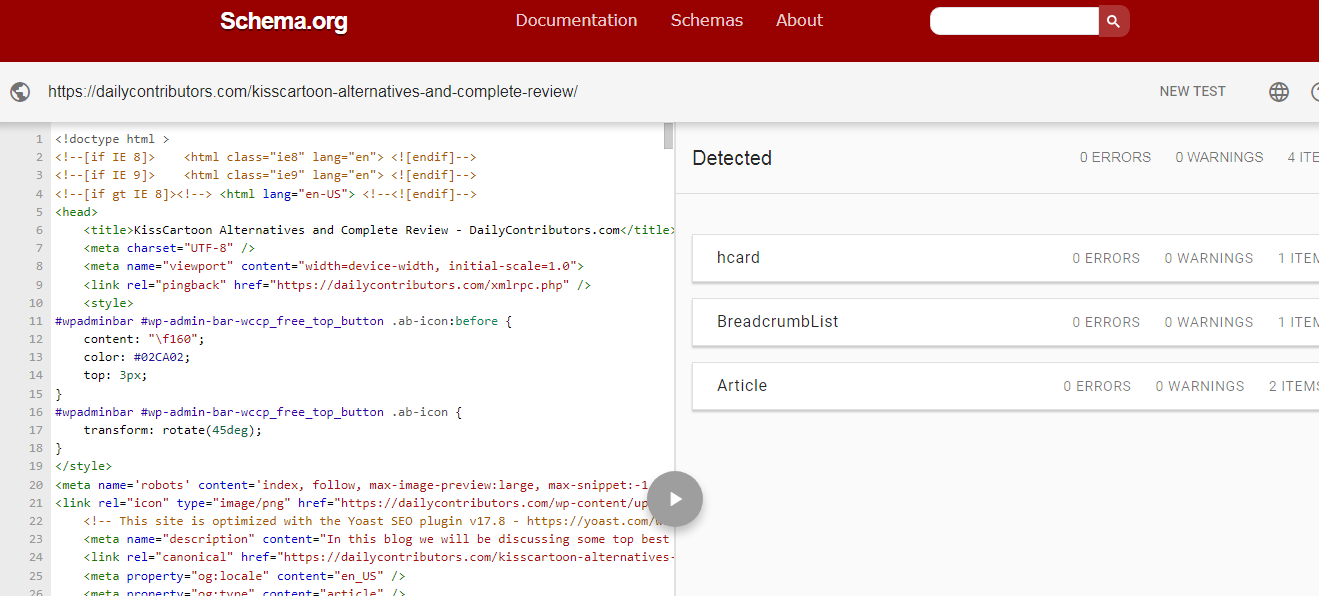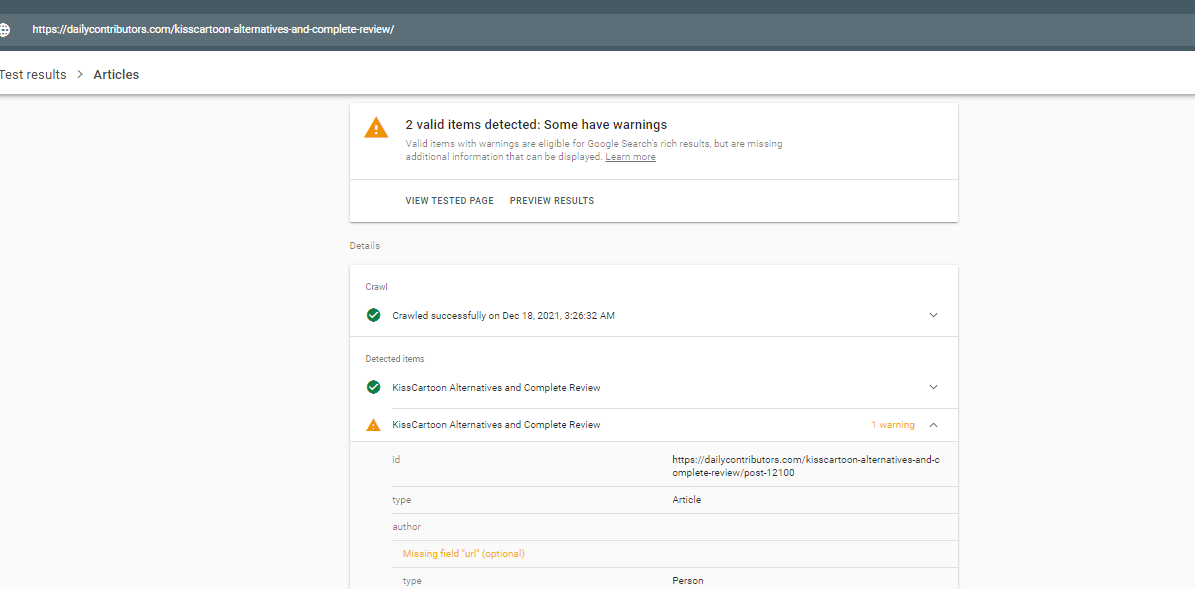Moz Q&A is closed.
After more than 13 years, and tens of thousands of questions, Moz Q&A closed on 12th December 2024. Whilst we’re not completely removing the content - many posts will still be possible to view - we have locked both new posts and new replies. More details here.
Schema Markup Warning "Missing field "url" (optional)"
-
Hello Moz Team, I hope everyone is doing well & good,
I need bit help regarding Schema Markup, I am facing issue in my schema markup specifically with my blog posts,
In my majority of the posts I find error "Missing field "url" (optional)"
As this schema is generated by Yoast plugin, I haven't applied any custom steps.Recently I published a post
https://dailycontributors.com/kisscartoon-alternatives-and-complete-review/
and I tested it at two platforms of schema test
1, Validator.Schema.org
2. Search.google.com/test/rich-resultsSo the validator generate results as follows and shows no error

It shows no error
But where as

in search central results it gives me a warning "Missing field "url" (optional)".
So is this really be going to issue for my ranking ? Please help thanks!
-
@JoeySolicitor I thinks , My website sam with your issue
Browse Questions
Explore more categories
-
Moz Tools
Chat with the community about the Moz tools.
-
SEO Tactics
Discuss the SEO process with fellow marketers
-
Community
Discuss industry events, jobs, and news!
-
Digital Marketing
Chat about tactics outside of SEO
-
Research & Trends
Dive into research and trends in the search industry.
-
Support
Connect on product support and feature requests.
Related Questions
-
What do we know about the "Shops" SERP Feature?
I came across this SERP Feature in a search today on a mobile device. It does not show for the same search query on desktop. What do we know about this "Shops" SERP feature? shops-blur.jpg
SERP Trends | | seoelevated0 -
Where did the "Location" go, on Google SERP?
In order to emulate different locations, I've always done a Google query, then used the "Location" button under "Search Tools" at the top of the SERP to define my preferred location. It seems to have disappeared in the past few days? Anyone know where it went, or if it's gone forever? Thanks!
Technical SEO | | measurableROI0 -
Staging site and "live" site have both been indexed by Google
While creating a site we forgot to password protect the staging site while it was being built. Now that the site has been moved to the new domain, it has come to my attention that both the staging site (site.staging.com) and the "live" site (site.com) are both being indexed. What is the best way to solve this problem? I was thinking about adding a 301 redirect from the staging site to the live site via HTACCESS. Any recommendations?
Technical SEO | | melen0 -
Google's "cache:" operator is returning a 404 error.
I'm doing the "cache:" operator on one of my sites and Google is returning a 404 error. I've swapped out the domain with another and it works fine. Has anyone seen this before? I'm wondering if G is crawling the site now? Thx!
Technical SEO | | AZWebWorks0 -
Trailing Slashes In Url use Canonical Url or 301 Redirect?
I was thinking of using 301 redirects for trailing slahes to no trailing slashes for my urls. EG: www.url.com/page1/ 301 redirect to www.url.com/page1 Already got a redirect for non-www to www already. Just wondering in my case would it be best to continue using htacces for the trailing slash redirect or just go with Canonical URLs?
Technical SEO | | upick-1623910 -
Should me URLs be uppercase or lowercase
I'm in the middle of doing a bunch of 301 redirects for me site. Should I make them Lowercase, uppercase, or does it matter? Also, do I want to be using hyphens (-), or underscores (_)? Any other tips? EX: http://www.stupid.com/golf-slippers.html OR http://www.stupid.com/Golf-Slippers.html
Technical SEO | | JustinStupid0 -
Meta tag "noindex,nofollow" by accident
Hi, 3 weeks ago I wanted to release a new website (made in WordPress), so I neatly created 301 redirects for all files and folders of my old html website and transferred the WordPress site into the index folder. Job well done I thought, but after a few days, my site suddenly disappeared from google. I read in other Q&A's that this could happen so I waited a little longer till I finally saw today that there was a meta robots added on every page with "noindex, nofollow". For some reason, the WordPress setting "I want to forbid search engines, but allow normal visitors to my website" was selected, although I never even opened that section called "Privacy". So my question is, will this have a negative impact on my pagerank afterwards? Thanks, Sven
Technical SEO | | Zitana0 -
Is "last modified" time in XML Sitemaps important?
My Tech lead is concerned that his use of a script to generate XML sitemaps for some client sites may be causing negative issues for those sites. His concern centers around the fact that the script generates a sitemap which indicates that every URL page in the site was last modified at the exact same date and time. I have never heard anything to indicate that this might be a problem, but I do know that the sitemaps I generate for other client sites can choose server response or not. What is the best way to generate the sitemap? Last mod from actual time modified, or all set at one date and time?
Technical SEO | | ShaMenz0